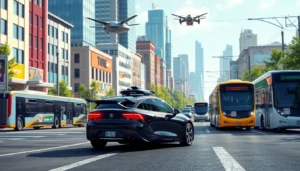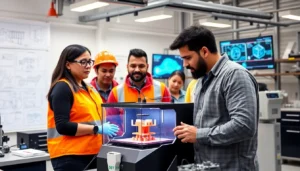Table of Contents
ToggleAs 2025 approaches, the world stands on the brink of an AI revolution that’s about to make your smartphone look like a flip phone. Emerging technologies are not just enhancing our lives; they’re redefining what it means to be human. Imagine AI that can predict your coffee order before you even wake up—yes, please!
Overview Of Emerging AI Technologies 2025
Emerging AI technologies in 2025 highlight a profound shift in everyday experiences. Predictive analytics will analyze user behavior patterns, allowing AI to anticipate needs in real-time. Voice recognition systems will achieve near-human accuracy, enhancing interactions across devices. Natural language processing will evolve, making conversations with AI smoother and more intuitive.
Robotic automation will become commonplace in various industries, significantly increasing efficiency. In healthcare, AI will assist in diagnosing diseases with improved precision, leading to early treatment options. Smart homes will integrate AI systems that learn resident habits, optimizing energy consumption and enhancing security.
Gaming experiences will leverage AI advancements to create more immersive environments. Personalized content generation will emerge, allowing users to receive tailored media based on their preferences. Education will transform with AI-powered tools providing customized learning experiences for students.
Data privacy concerns will remain at the forefront as regulatory frameworks adapt to new technologies. Ethical considerations will guide AI development, ensuring responsible use in society. Collaboration between humans and AI will lead to groundbreaking solutions across sectors, shaping a future rich with possibilities.
Overall, 2025 promises to showcase AI technologies that seamlessly integrate into daily life, transforming interactions and outcomes across multiple domains.
Key Trends In AI Development
Emerging AI technologies will drive significant changes across various sectors by 2025. Notable trends include increased automation and advancements in natural language processing.
Increased Automation In Industries
Automation in industries will reach new heights, transforming workflows and operational efficiency. Many companies will adopt AI-driven solutions to streamline repetitive tasks, reducing human error. Factories will rely on intelligent robots that manage assembly lines, while logistics will leverage AI for optimized supply chain management. The healthcare sector will implement automated systems for routine tasks like patient scheduling and data entry. These advancements will not only improve productivity but also free human workers to focus on complex challenges requiring creativity and critical thinking.
Advancements In Natural Language Processing
Natural language processing will evolve, enabling more intuitive interactions with AI systems. Progress in this area will lead to more accurate understanding of user intent and context, enhancing communication. Enhanced chatbots will engage in meaningful conversations, providing support tailored to individual needs. Businesses will utilize NLP for sentiment analysis, gaining insights from customer feedback. As AI systems become capable of nuanced dialogue, language barriers will decrease, fostering global connectivity and collaboration. These advancements will make it easier for users to navigate various applications in everyday life.
Impact On Business And Economy
Emerging AI technologies are set to reshape the business landscape and influence the economy significantly. Companies will adapt to these advancements, fostering new market dynamics and operational efficiencies.
Transformation Of Traditional Businesses
Traditional businesses will experience profound transformation through AI adoption. Enhanced data analytics tools will allow organizations to understand customer behavior and market trends more accurately. Supply chains will undergo redesign, employing AI to optimize inventory management and delivery processes. Retailers will implement AI-driven solutions for personalized customer experiences, from product recommendations to targeted marketing strategies. Moreover, financial services will leverage AI for real-time fraud detection, improving security for consumers.
Job Creation And Displacement
Job creation and displacement will occur as AI technologies evolve. Innovative roles will emerge, focusing on overseeing AI systems and developing ethical frameworks. Skills in data science and machine learning will see heightened demand, encouraging workforce reskilling. However, some positions involving repetitive tasks may face reduction due to increased automation. Balancing these changes requires strategic investment in education and training programs. The business landscape will demand adaptability from the workforce to thrive amidst these shifts.
Ethical Considerations And Challenges
Emerging AI technologies bring ethical challenges that require careful assessment. Addressing these concerns ensures responsible AI development and implementation.
Bias And Fairness In AI
Recognizing bias in AI algorithms proves crucial as these systems learn from historical data. Companies must examine training datasets to minimize unfair outcomes. Examples of bias can lead to discrimination in hiring processes and biased lending practices. Prioritizing fairness can foster trust in AI, enabling broader acceptance among users. As AI becomes central to decision-making, ensuring equal treatment across demographics remains a pressing challenge. Organizations are encouraged to implement auditing mechanisms that continuously assess AI fairness.
Privacy And Security Issues
Privacy concerns escalate as AI systems collect vast amounts of personal data. Protecting user information requires stringent measures to uphold data integrity. Encryption, anonymization, and access controls play pivotal roles in securing sensitive information. Regulatory frameworks need to adapt swiftly, keeping pace with technological advancements. Transparency in data use boosts user confidence and encourages responsible AI practices. Addressing security vulnerabilities must occur proactively to safeguard against data breaches. Balancing innovation with privacy protection emerges as an essential focus for developers and users alike.
Future Prospects And Innovations
Emerging AI technologies in 2025 promise significant advancements that will shape various industries. Predictive analytics enables real-time analysis of user behavior, allowing for anticipated needs. Near-human accuracy in voice recognition systems enhances device interactions. Natural language processing transforms conversations into seamless exchanges, fostering better user engagement.
Automation reaches new heights across sectors, optimizing workflows and operational efficiency. Companies adopt AI-driven solutions to reduce human error through streamlined task management. Intelligent robots on assembly lines manage tasks effectively, while logistics sees optimization in supply chain processes. Healthcare automation handles routine processes like patient scheduling, freeing human resources for complex issues.
Enhanced chatbots emerge with the evolution of natural language processing, providing tailored conversations and support. Sentiment analysis tools will help businesses mine customer feedback for valuable insights. Decreased language barriers spark global connectivity as AI systems facilitate nuanced communication.
Robotic automation significantly improves industry efficiency, particularly in healthcare. AI aids in precise disease diagnosis, allowing for faster treatment decisions. Smart home integrations optimize energy use while ensuring security, enhancing overall living experiences. Gaming environments see immersion improvements, while education evolves with AI tools that provide personalized learning paths.
Data privacy concerns remain crucial as regulatory frameworks adapt to these emerging technologies. Ethical considerations guide AI development, ensuring responsible societal use. Businesses adapt to technological advancements, fostering new market dynamics and optimizing operations.
Job creation and displacement dynamics unfold as AI technology advances. Industries will see new roles focused on overseeing AI and ethical implementation. Increased demand for data science and machine learning skills necessitates workforce reskilling. Repetitive task positions may diminish due to automation, emphasizing the importance of strategic investments in education and training.
Bias in AI algorithms poses challenges, potentially leading to discrimination in critical areas like hiring and lending. Companies must implement auditing mechanisms to promote fairness and trust in AI. Security measures become essential to protect vast amounts of personal information. Balancing innovation with privacy protection will define the AI landscape in 2025.
As 2025 approaches the landscape of AI technologies is set to undergo a remarkable transformation. The integration of advanced predictive analytics and natural language processing will redefine how individuals interact with technology. With automation streamlining operations across industries the efficiency gains will be significant.
However the rapid advancement of AI also brings ethical considerations and data privacy challenges that must be addressed. Companies will need to prioritize transparency and fairness in their AI systems to build trust with users. As emerging technologies continue to shape daily life the balance between innovation and ethical responsibility will be vital in ensuring a positive future for society.







